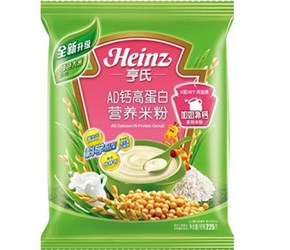Heinz Recalls Chinese Baby Cereal Due To Excessive Levels Of Lead
By Laurel Maloy, contributing writer, Food Online

The H.J. Heinz Company is under the spotlight as unsafe levels of lead are found in boxes of baby cereal in Zhejiang province in Eastern China
As is the case with most food safety issues emanating from China, the full details will most likely trickle in slowly. However, what is most troubling is that a large, well-known, U.S.-based food company is again guilty of a grave food safety violation in China. The company has recalled more than 1,400 boxes from four batches of its infant product “Heinz AD Calcium Hi-Protein Cereal.”
Pittsburgh-based Heinz has not been very forthcoming with information. The company issued a written statement in which it admitted to one of the cereal ingredients, degreased soybean cereal, containing excessive levels of lead. Company spokesman, Michael Mullen emailed comments to Reuters, seeming to downplay the incident, “This relates to an isolated, regional withdrawal in eastern China. Extensive testing confirmed that no other Heinz baby food varieties are affected.” The question I, as a consumer, would be asking is, “Why was the ingredient not tested prior to inclusion, especially in a baby cereal?”
Is Your Company Prepared For A Recall? Here Are Seven Key Steps To Help Prepare
The recall affects a relatively small amount of cereal, but to a parent who may have purchased and fed this baby cereal to an infant, it is not small or insignificant. Lead is particularly dangerous to the young. In extreme cases, exposure to lead can cause seizures, coma, and end the life of an infant or child. The long-term effects may not be known for years, as it can cause learning disabilities and behavioral problems. According to the Centers for Disease Control and Prevention (CDC) in Atlanta, “Even low levels of lead in blood have been shown to affect IQ, ability to pay attention, and academic achievement.” The CDC goes on to say that the effects of lead exposure are permanent and cannot be corrected.
The Zhejiang Food and Drug Administration and Heinz say 1,472 boxes of the cereal are contaminated. The Chinese agency also stated that another 153 boxes have been removed from retail establishments and sealed up in a warehouse located in Guangzhou, in southern China. Heinz says it will destroy those 153 boxes, but the regulators in China are calling for compensation.
According to Heinz, the company is recalling 400-gram boxes of the cereal with batch numbers: 20140413, 20140414, 20140508, and 20140509 — the last three batch numbers are being recalled as a precautionary measure, as they contain the same degreased soybean product. An inspection of 303 food vendors in the province netted 483 boxes from two different Chinese trade companies in Hangzhou, the provincial capital, and 131 boxes from various retailers. The number of boxes estimated to be on consumer’s shelves has not been released, though if you do the math, there are at least 767 boxes of tainted cereal unaccounted for.
What does Cornell have to say about food supply chain transparency and consumer trust?
China is no stranger to highly publicized food safety violations. The largest debacle in its history is the 2008 recall of baby formula, with more than 700 tons of the product being recalled. Hundreds of thousands of babies were sickened and six infants died as the result of a Chinese dairy adding melamine, an industrial chemical, to watered-down milk. More recently, China-based KFCs, Pizza Huts, and McDonald’s were victims of a U.S.-owned company in China, OSI Group, repackaging and distributing meat past its expiration date.
In light of this latest egregious oversight from a U.S.-based company, it is expected China’s mistrust of U.S. products may equal the U.S.’s mistrust of Chinese food products. Will FSMA’s guidance and regulation on imports ensure a safer global food supply? It appears that corporate responsibility should be the focus of all in the global food supply chain.
